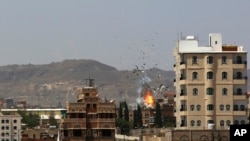As fighting rages on in Yemen, troops from the United Arab Emirates that are part of a Saudi-led coalition battling Shiite rebels are pushing toward the country's rebel-held capital, Sana'a, after securing a strategic provincial city, the commander of an Emirati contingent said Monday.
They hope their campaign will push the rebels out and help restore Yemen's legitimate government. Emirati Brig. Gen. Ali Saif al-Kaabi told reporters during a visit to the front-lines, insisting the coalition forces were not "coming to occupy Yemen.''
The Emiratis are part of thousands of Saudi and UAE forces fighting on the ground in Yemen to reverse the territorial gains by the Iran-backed rebels known as Houthis, who captured Sana'a last year and much of the country's north. The Saudi-led coalition launched its campaign of airstrikes against the Houthis in March.
The presence of troops from the oil-rich Gulf states could be a game-changer in the bitter war that pits the Houthis and troops loyal to former President Ali Abdullah Saleh against an array of forces, including southern separatists, local and tribal militias, Sunni Islamic militants as well as troops loyal to exiled President Abed Rabbo Mansour Hadi.
Pro-government forces recently pushed the Houthis out of several key southern areas in Yemen. The conflict has killed more than 4,000 people, leaving the Arab world's poorest country in the grip of a humanitarian crisis and on the brink of famine.
On Monday, al-Kaabi told media crews during an exclusive visit to UAE troops fighting on the ground in Yemen, that the Saudi-led coalition has secured the city of Marib, the capital of Marib province.
Marib and the southern port city of Aden, from which the rebels were expelled earlier this summer, are the staging ground for the coalition's two-pronged push for Sana'a, added al-Kaabi, who is leading the UAE forces in Marib province.
But while firmly in control of Marib city, about 200 kilometers (125 miles) west of Sana'a, the Emirati troops face a difficult terrain of towering mountains between them and the Yemeni capital, said the Emirati commander.
Al-Kaabi compared the area to the terrain in some parts of Afghanistan, where Emirati forces contributed to the U.S.-led coalition. The mountainous region, he said, has also been peppered with land mines planted by the Houthis and Saleh's loyalists.
An Emirati soldier was killed by one such land mine on Monday - the second to die in as many days, bringing the death toll for Emirati forces in Yemen to 54 since Sept. 5, when a missile hit their sprawling Forward Operating Base Saffer. At least 10 soldiers from Saudi Arabia and five from Bahrain also were killed in that attack.
But instead of breaking the coalition's will, the September missile assault prompted the U.S.-backed alliance to intensify what has effectively become a proxy war against Iran.
"We won't forget our blood,'' al-Kaabi said of the attack earlier this month, which killed 52 UAE soldiers. It was the heaviest military loss for the Emirates since the Gulf country was founded in 1971. "This is a personal thing for the soldiers.''
The Emiratis subsequently deployed Patriot missile batteries to the base, to prevent a similar attack by the Houthis. At the large and well-established base, there are also dozens of American-made armored fighting vehicles, Blackhawk helicopters and French main battle tanks.
Before the September attack, coalition countries avoided acknowledging they had ground troops in the impoverished Arabian Peninsula country, while Yemeni security officials said that Saudi, Emirati, Egyptian and Jordanian military advisers were training hundreds of fighters at a military base in Aden. The Saudis also are supplying weapons and providing military advice in the fight for control of their southern neighbor, the Yemenis have said.
Taking the small Marib provincial capital was important and strategic, al-Kaabi added, because "if you want to go to Sana'a, you need to get to Marib, it's the last line.''
Now, the "city is in our hands,'' he said. "The enemy is in the mountains.''
Yemeni military officials loyal to the exiled President Hadi, who is in Saudi Arabia, told reporters in Marib that their units and fighters, backed by coalition air support, took new ground after fierce clashes with Houthis and their loyalists.
At least seven pro-Hadi fighters and 11 of their opponents were killed in a battle to control strategic higher ground on Monday, the officials said, speaking on condition of anonymity in line with regulations.
Eyewitnesses and tribal officials, speaking on condition of anonymity for fear of reprisals, said coalition planes launched dozens of airstrikes on rebel positions in the area around the day's fighting.
Saudi military officials also said five Saudi soldiers were killed Sunday by fire from across its border with Yemen and a helicopter pilot died when his chopper crashed during a training mission.
A Saudi armed forces statement said the five died in the southwest region of Najran, while the helicopter crashed due to a technical defect in the Taif area, killing its pilot.
In Yemen, UAE Troops Push Toward Rebel-held Capital

FORWARD OPERATING BASE SAFFER, YEMEN —



